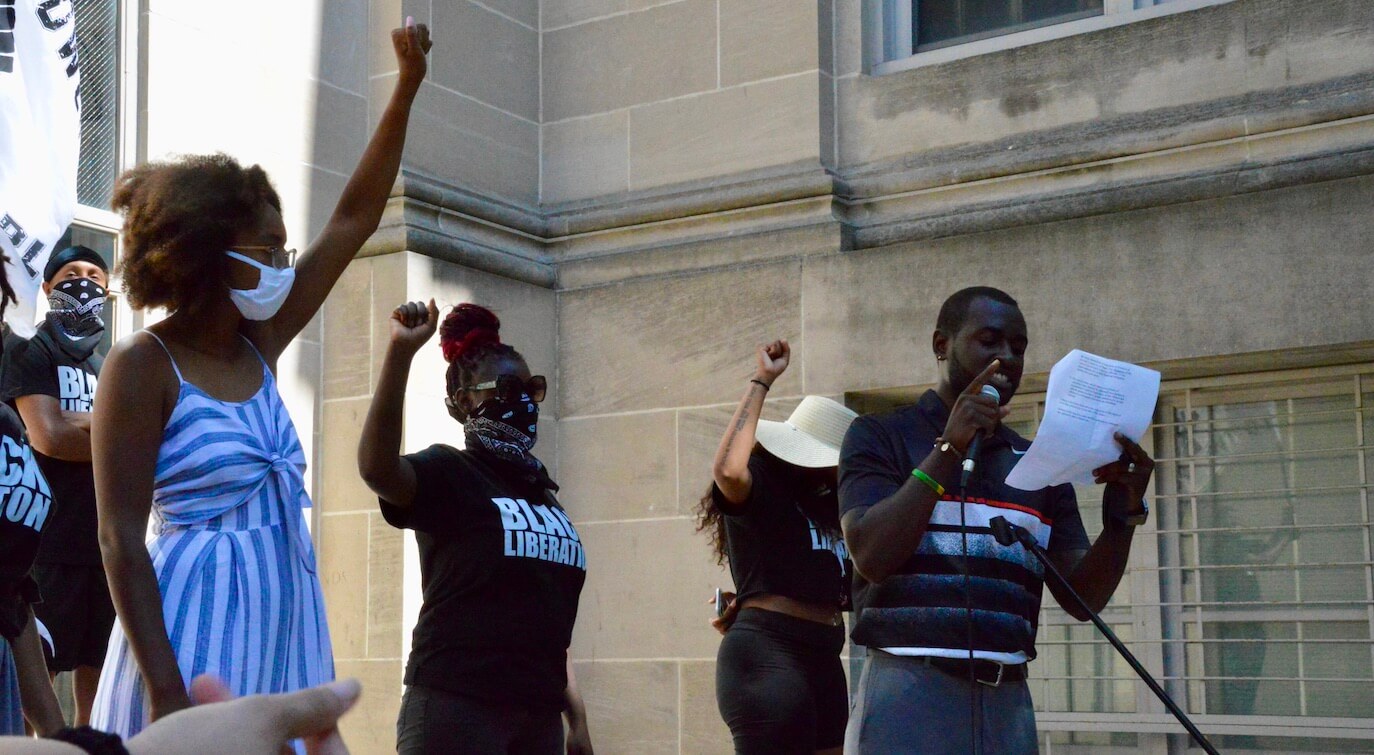
Gov. Kim Reynolds promised she would sign an executive order that would finally end Iowa’s distinction as the only state in the country that doesn’t automatically restore former felons’ voting rights in some way. Since that promise in June, which prompted Senate Republicans to abandon the constitutional amendment route, everyone’s been waiting and waiting for her to follow through.
Black Lives Matter activists and supporters, as well as many Democratic legislators, have had enough, and a group of them gathered yesterday in Des Moines to offer the Governor a little help.
“It’s been 26 days since our governor promised to sign an executive order,” State Rep. Ras Smith of Waterloo told the crowd of around 200 outside Des Moines East High School.
[inline-ad id=”2″]
The Des Moines Black Lives Matter organization released their own proposed language for an executive order, noting that Reynolds had said she’d release her own back during their meeting on June 12. She still hasn’t.
“In that meeting, Gov. Reynolds promised to have language the following Monday,” organizer Ellie Odole said at the rally. “Unsurprisingly, our governor failed to bring any language. It’s now July 11th, and Iowans are still disenfranchised because of their prior convictions … We will not accept such a lack of urgency.”
Many have pointed to former Gov. Tom Vilsack’s 2005 executive order restoring voting rights as an easy basis to build off of for Reynolds. The proposed language that the Black Lives Matter activists put out pulls directly from several sections of the Vilsack order.
[inline-ad id=”3″]
“The rights of citizenship, including the right to vote and qualification to hold public office, which were forfeited by reason of conviction, shall be restored for all offenders who either have completed their term of imprisonment, or who were subject to an order of disposition where no sentence of imprisonment was imposed,” the language reads, adding to Vilsack’s words by noting those who may have been convicted of a felony but were given no imprisonment sentence.
Republicans in the Statehouse tried to impose extra qualifications for who could get their voting rights back, attempting to force Iowans to pay back restitution before regaining their rights. That effort, however, was directly tied to the constitutional amendment approach, which was abandoned late in the session.
[inline-ad id=”4″]
This new proposed language makes it clear there aren’t such exemptions.
“From this date forward, the rights of citizenship shall be restored for all offenders immediately upon release from imprisonment regardless of any remaining conditions of custodial release, including probation, parole, special-sentence supervision, work release, or payment of restitution, fines, fees, or other financial obligations resulting from conviction,” it reads. “For offenders who are convicted but not sentenced to a term of imprisonment, or whose sentences are deferred or suspended, rights of citizenship shall be restored following adjudication of guilt and immediately upon imposition of sentence.”
Speakers at the Saturday event emphasized how crucial the right to vote is to the broader mission of racial equity in Iowa.
“How do we change all this?” Linn County Supervisor Stacey Walker asked of racial injustice. “One of the ways to do this is by having the franchise — being able to control our own destiny through electoral politics.”
[inline-ad id=”1″]
Deidre DeJear, who was Democrats’ nominee for secretary of state in 2018, called on Reynolds to follow through on her words.
“We have a governor right now who needs to do her role,” DeJear said. “If she believes in the right to vote, if she believes that is the most fundamental mechanism of our democracy … she’s gotta do something about it.”
“The fact of the matter is, they served the time they were asked to serve,” DeJear added of former felons.
[signup_form]
Just like Vilsack’s order did, this proposed language points to the racial disparities that denying voting rights restitution can have on people of color. As activists have often mentioned at events, while Iowa’s population is only about 4% black, a quarter of the state’s prison population is black, a result of policing choices, the justice system’s focus on certain crimes and economic inequality.
“Disenfranchisement of individuals convicted of a felony has a disproportionate racial impact thereby diminishing the representation of minority populations in our great state,” the proposed executive order reads in part. “Tens of thousands of Iowans convicted of felonies who are living, working, and paying taxes in the state, including those on parole, probation, work release, and special-sentence supervision, are denied the right to vote as a result of a prior conviction … restoration of the right to vote is an important aspect of reintegrating offenders in society as law-abiding and productive citizens.”
by Pat Rynard
Posted 7/12/20
Iowa Starting Line is an independently-owned progressive news outlet devoted to providing unique, insightful coverage on Iowa news and politics. We need reader support to continue operating — please donate here. Follow us on Twitter and Facebook for more coverage.
Politics

Biden marks Earth Day by announcing $7 billion in solar grants
The Biden administration on Monday announced the recipients of its Solar For All Program, a $7 billion climate program that aims to lower energy...

6 terrifying things that could happen if the Comstock Act is used to target abortion
Does 1873 sound like a really, really long time ago? Well, that’s because it is—but if Republicans and far-right anti-abortion activists have their...
Local News

No more Kum & Go? New owner Maverik of Utah retiring famous brand
Will Kum & Go have come and gone by next year? One new report claims that's the plan by the store's new owners. The Iowa-based convenience store...

Here’s a recap of the biggest headlines Iowa celebs made In 2023
For these famous Iowans, 2023 was a year of controversy, career highlights, and full-circle moments. Here’s how 2023 went for the following Iowans:...





